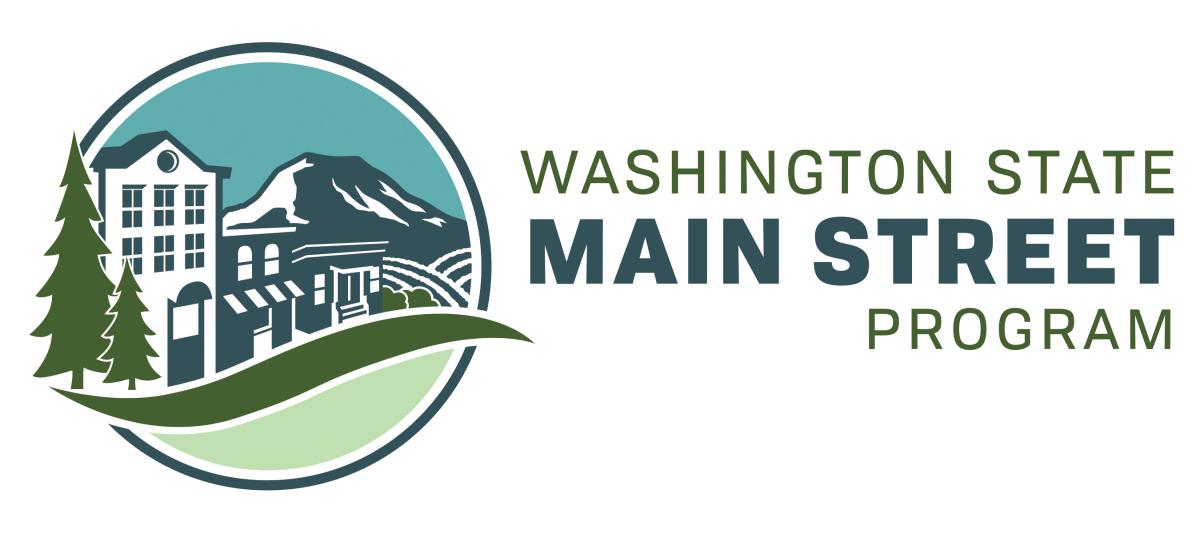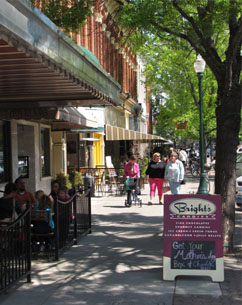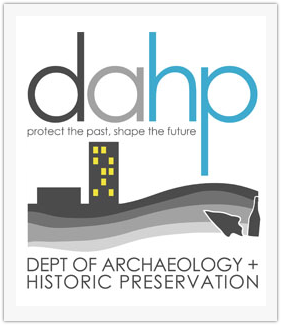Main Street Program
 Since 1984, the Washington State Main Street Program has been helping communities revitalize the economy, appearance, and image of their downtown commercial districts using the successful Main Street Four-Point Approach®. Main Street is a comprehensive, incremental approach to revitalization built around a community's unique heritage and attributes. Using local resources and initiative, the state program helps communities develop their own strategies to stimulate long term economic growth and pride in the heart of the community- downtown.
Since 1984, the Washington State Main Street Program has been helping communities revitalize the economy, appearance, and image of their downtown commercial districts using the successful Main Street Four-Point Approach®. Main Street is a comprehensive, incremental approach to revitalization built around a community's unique heritage and attributes. Using local resources and initiative, the state program helps communities develop their own strategies to stimulate long term economic growth and pride in the heart of the community- downtown.
In 2010 the Main Street Program was moved from the Department of Commerce to the Department of Archaeology & Historic Preservation. The program is managed (under contract) by the Washington Trust for Historic Preservation, a statewide non-profit organization.
- List of Main Street Communities
- Access Main Street Program Resources
Main Street Four-Point Approach®

The Main Street Four-Point Approach® is a unique preservation-based economic development tool that enables communities to revitalize downtown and neighborhood business districts by leveraging local assets - from historic, cultural, and architectural resources to local enterprises and community pride. It is a comprehensive strategy that addresses the variety of issues and problems that challenge traditional commercial districts.
Since its founding in 1980, Main Street has been the leader of a coast-to-coast network now encompassing more than 2,000 programs and leaders who use the Main Street Approach® to rebuild the places and enterprises that create sustainable, vibrant communities. This approach has been implemented in over 1,200 cities and towns in 40 states across the nation with the help of the National Main Street Center and statewide downtown revitalization programs.
The success of the Main Street Approach® is based on its comprehensive nature. By carefully integrating four points into a practical downtown management strategy, a local Main Street program will produce fundamental changes in a community’s economic basetional Main Street Center and statewide downtown revitalization programs.
The four points and eight guiding principles of the Main Street approach work together to build a sustainable and complete community revitalization effort.
Organization involves building a Main Street framework that is well represented by business and property owners, bankers, citizens, historic preservationists, entrepreneurs, public officials, chambers of commerce, and other local economic development organizations. Everyone must work together to renew downtown. A strong organization provides the structure and stability to build and maintain a long-term effort.
Promotion creates excitement and vibrancy downtown. Street festivals, parades, retail events, and image development campaigns are some of the ways Main Street provides education on what’s downtown and encourages customer traffic. Promotion involves marketing an enticing image to shoppers, investors, and visitors.
Design enhances the look and feel of the commercial district. Historic building rehabilitation, street and alley clean-up, landscaping, street furniture, signage, visual merchandising and lighting all improve the physical image of the downtown as a quality place to shop, work, walk, invest in, and live. Design improvements result in a reinvestment of public and private dollars to downtown.
Economic Vitality involves analyzing current market forces to develop long-term solutions. Recruiting new businesses, creatively converting unused space for new uses, and sharpening the competitiveness of Main Street’s traditional merchants are examples of economic vitality activities.
The Eight Guiding Principles
- Comprehensive. A single project cannot revitalize a downtown or commercial neighborhood. An ongoing series of initiatives is vital to build community support and create lasting progress.
- Incremental. Small projects make a big difference. They demonstrate that “things are happening” on Main Street and hone the skills and confidence the program will need to tackle more complex projects.
- Self-Help. The state can provide valuable direction and technical assistance, but only local leadership can breed long-term success by fostering and demonstrating community involvement and commitment to the revitalization effort.
- Public/Private Partnership. Every local Main Street program needs the support and expertise of both the public and private sectors. For an effective partnership, each must recognize the strengths and weaknesses of the other.
- Identifying and Capitalizing on Existing Assets. Unique offerings and local assets provide the solid foundation for a successful Main Street initiative.
- Quality. From storefront design to promotional campaigns to special events, quality must be instilled in the organization.
- Change. Changing community attitudes and habits is essential to bring about a commercial district renaissance. A carefully planned Main Street program will help shift public perceptions and practices to support and sustain the revitalization process.
- Action Oriented. Frequent visible changes in the look and activities of the commercial district will reinforce the perception of positive change. Small, but dramatic, improvements early in the process will remind the community that the revitalization effort is underway
Services
The Washington State Main Street Program provides access to information, help getting focused, and community support and guidance to individuals and organizations interested in downtown revitalization. It also serves as a general clearinghouse for the latest tools and techniques in downtown development. General information, project development assistance information, and audio-visual and resource materials area also available.
The State Program is a partner, but true revitalization success is built squarely on local commitment, initiative, and follow-through. Recognizing that Washington communities interested in revitalization have a variety of situations and needs, the Washington Main Street Network has two ways to get involved.
Washington State Main Street Community
The purpose of the Main Street Community level is to provide access to resources, networking opportunities, training and advanced resources and opportunities to communities who have an independent 501c3 or 501c6 nonprofit organization dedicated solely to downtown revitalization. These organizations have committed the necessary time and training to develop community support, financial and human resources and are implementing the Main Street Four-Point Approach(R).
Washington State Main Street Affiliate
The purpose of the Affiliate level is to provide access to resources and networking opportunities tfor organizations that have an interest in revitalizing their downtown or neighborhood commercial district, but may not have the capacity at this time to meet the Washington State Main Street Community requirements.
Join Washington Main Street
If your community has been rallying around the Main Street Approach as a tool for downtown vitality, you may be interested in applying to join the Washington State Main Street Program under one of our two designations:
Main Street Communities have met a number of organizational development criteria and are already using the Main Street Approach as a model for their downtown revitalization initiatives.
Affiliates are organizations or municipalities that are interested in the Main Street Approach and see benefit to being connected to the WSMSP network.
Please visit the Washington Trust for Historic Preservation website's Main Street Program page for more information at www.preservewa.org/mainstreet. You can also direct any questions to Breanne Durham at bdurham@preservewa.org.
For more information contact:
Breanne Durham
Main Street Program Coordinator
Washington Trust for Historic Preservation
1204 Minor Avenue
Seattle, Wa 98101
(p) 206-624-9449
(f) 206-624-2410
email: bdurham@preservewa.org
www.preservewa.org/mainstreet




